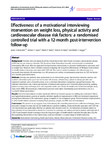Effectiveness of a motivational interviewing intervention on weight loss, physical activity and cardiovascular disease risk factors: a randomised controlled trial with a 12-month post-intervention follow-up
| dc.contributor.author | Hardcastle, SJ | |
| dc.contributor.author | Taylor, Adrian | |
| dc.contributor.author | Bailey, MP | |
| dc.contributor.author | Harley, RA | |
| dc.contributor.author | Hagger, MS | |
| dc.date.accessioned | 2016-08-24T15:48:02Z | |
| dc.date.available | 2016-08-24T15:48:02Z | |
| dc.date.issued | 2013 | |
| dc.identifier.issn | 1479-5868 | |
| dc.identifier.issn | 1479-5868 | |
| dc.identifier.other | ARTN 40 | |
| dc.identifier.uri | http://hdl.handle.net/10026.1/5376 | |
| dc.description.abstract |
BACKGROUND: Intensive diet and physical activity interventions have been found to reduce cardiovascular disease (CVD) risk, but are resource intensive. The American Heart Association recently recommended motivational interviewing (MI) as an effective approach for low-intensity interventions to promote health-related outcomes such as weight loss. However, there is limited research evaluating the long-term effectiveness of MI-based interventions on health-related outcomes associated with CVD risk. The current research evaluated the effectiveness of a six-month low-intensity MI intervention in a UK primary-care setting in maintaining reductions in CVD risk factors at12 months post-intervention. METHODS: Primary-care patients were randomised to an intervention group that received standard exercise and nutrition information plus up to five face-to-face MI sessions, delivered by a physical activity specialist and registered dietician over a 6-month period, or to a minimal intervention comparison group that received the standard information only. Follow-up measures of behavioural (vigorous and moderate physical activity, walking, physical activity stage-of-change, fruit and vegetable intake, and dietary fat intake) and biomedical (weight, body mass index [BMI], blood pressure, cholesterol) outcomes were taken immediately post-intervention and at a 12-month follow-up occasion. RESULTS: Intent-to-treat analyses revealed significant differences between groups for walking and cholesterol. Obese and hypercholesterolemic patients at baseline exhibited significant improvements in BMI and cholesterol respectively among those allocated to the intervention group compared to the comparison group. Post-intervention improvements in other health-related outcomes including blood pressure, weight, and BMI were not maintained. CONCLUSIONS: The present study suggests that a low-intensity MI counselling intervention is effective in bringing about long-term changes in some, but not all, health-related outcomes (walking, cholesterol levels) associated with CVD risk. The intervention was particularly effective for patients with elevated levels of CVD risk factors at baseline. Based on these findings future interventions should be conducted in a primary care setting and target patients with high risk of CVD. Future research should investigate how the long-term gains in health-related outcomes brought about by the MI-counselling intervention in the current study could be extended to a wider range of health outcomes. | |
| dc.format.extent | 40-40 | |
| dc.format.medium | Electronic | |
| dc.language | en | |
| dc.language.iso | eng | |
| dc.publisher | Springer Science and Business Media LLC | |
| dc.subject | Motivational interviewing | |
| dc.subject | Health promotion | |
| dc.subject | Obesity | |
| dc.subject | Blood pressure | |
| dc.subject | Cholesterol | |
| dc.subject | Physical activity | |
| dc.subject | Diet | |
| dc.title | Effectiveness of a motivational interviewing intervention on weight loss, physical activity and cardiovascular disease risk factors: a randomised controlled trial with a 12-month post-intervention follow-up | |
| dc.type | journal-article | |
| dc.type | Journal Article | |
| dc.type | Randomized Controlled Trial | |
| dc.type | Research Support, Non-U.S. Gov't | |
| plymouth.author-url | https://www.webofscience.com/api/gateway?GWVersion=2&SrcApp=PARTNER_APP&SrcAuth=LinksAMR&KeyUT=WOS:000318641100001&DestLinkType=FullRecord&DestApp=ALL_WOS&UsrCustomerID=11bb513d99f797142bcfeffcc58ea008 | |
| plymouth.issue | 1 | |
| plymouth.volume | 10 | |
| plymouth.publication-status | Published | |
| plymouth.journal | International Journal of Behavioral Nutrition and Physical Activity | |
| dc.identifier.doi | 10.1186/1479-5868-10-40 | |
| plymouth.organisational-group | /Plymouth | |
| plymouth.organisational-group | /Plymouth/Faculty of Health | |
| plymouth.organisational-group | /Plymouth/Faculty of Health/Peninsula Medical School | |
| plymouth.organisational-group | /Plymouth/REF 2021 Researchers by UoA | |
| plymouth.organisational-group | /Plymouth/REF 2021 Researchers by UoA/UoA03 Allied Health Professions, Dentistry, Nursing and Pharmacy | |
| plymouth.organisational-group | /Plymouth/Research Groups | |
| plymouth.organisational-group | /Plymouth/Research Groups/FoH - Community and Primary Care | |
| plymouth.organisational-group | /Plymouth/Research Groups/Institute of Health and Community | |
| plymouth.organisational-group | /Plymouth/Research Groups/Institute of Translational and Stratified Medicine (ITSMED) | |
| plymouth.organisational-group | /Plymouth/Research Groups/Institute of Translational and Stratified Medicine (ITSMED)/CCT&PS | |
| plymouth.organisational-group | /Plymouth/Research Groups/Plymouth Institute of Health and Care Research (PIHR) | |
| plymouth.organisational-group | /Plymouth/Users by role | |
| plymouth.organisational-group | /Plymouth/Users by role/Academics | |
| plymouth.organisational-group | /Plymouth/Users by role/Researchers in ResearchFish submission | |
| dc.publisher.place | England | |
| dcterms.dateAccepted | 2013-03-18 | |
| dc.identifier.eissn | 1479-5868 | |
| dc.rights.embargoperiod | Not known | |
| rioxxterms.versionofrecord | 10.1186/1479-5868-10-40 | |
| rioxxterms.licenseref.uri | http://www.rioxx.net/licenses/all-rights-reserved | |
| rioxxterms.licenseref.startdate | 2013-03-28 | |
| rioxxterms.type | Journal Article/Review |


